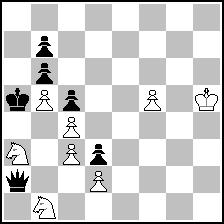
Website founded by
Milan Velimirović
in 2006
23:40 UTC


| |
MatPlus.Net  Forum Forum  Promenade Promenade  Silvester joke Silvester joke |
| |
|
|
|
|
You can only view this page!
| | | (1) Posted by Hauke Reddmann [Monday, Dec 31, 2018 09:19] | Silvester joke
 (= 2+1 ) (= 2+1 )
Position is such that after 13 moves (26 halfmoves)
Black may and will successfully claim a draw due to the
50 move rule. Win?
Happy New Year, Hauke
| | | (2) Posted by Per Olin [Thursday, Jan 10, 2019 13:08] |
A guess: this must have to do with the known fact that when a move checkmates the opponent, this move can also fulfill the 50 moves rule (=draw when 50 moves without captures or pawn moves completed or even 49 moves with expressed intention by the party to move to make a move leading to fulfillment of the 50 moves rule). The answer to the question asked, 'Win?', is 'Yes' and/or 'No'.
| | | (3) Posted by Andrew Buchanan [Thursday, Jan 10, 2019 18:55] |
- If White cannot castle, then it takes him 14 White moves to mate, whether White or Black has the move.
- If White could castle, then it would take him 13 White moves to mate, whether White or Black has the move.
- However, if Black has the move, White certainly can't castle.
- And if White has the move, then in order for White to be able to castle, Black must have just captured, which would reset the draw counter.
So the game is a draw.
It's not relevant here, but if the 50.0th non-pawn, non-capture move checkmates, then over the board the checkmater only has the opportunity to claim a draw. Either way the game is over before the other player gets a chance to decide. The necessary machinery has no place being replicated in the compositional world: instead I suppose that the 50.0th such move automatically terminates the game if it's not checkmate.
| | | (4) Posted by Sarah Hornecker [Friday, Jan 11, 2019 00:36]; edited by Sarah Hornecker [19-01-11] |
"The necessary machinery has no place being replicated in the compositional world"
Too late!
 (= 8+6 ) (= 8+6 )
Noam Elkies, Internet 1991
White to move and draw (50 move rule)
1.f6 Qb3 2.f7!! Qd1+ 3.Kh6, etc.
Try: 2.Kh6? Qd1 3.f7, and White loses the f-pawn just in time
| | | (5) Posted by Andrew Buchanan [Friday, Jan 11, 2019 01:30]; edited by Andrew Buchanan [19-01-11] |
Hi Noam's problem is brilliant and non-controversial - I put the solution into PDB a while ago so you can see the pieces move around: https://pdb.dieschwalbe.de/search.jsp?expression=probid=%27P1308962%27
But that's not my point at all. Codex Article 17 is unsatisfactory, because it merely gives criteria when "the 50-move rule" should apply. But in order to apply to problems, we must dispense with the "unnecessary machinery": the player's choice, the physical board, the clock, the score-sheet and the arbiter, as has been neatly done for Codex Article 18 on draw by repetition: all that matters is the solution and the proof game. Of course, implicitly we nearly do so already in our thinking, so the need Convention to be fixed to reflect this.
Some people say there are "positions which are both stalemate and checkmate". I don't think that for a problem one can make any sense of board, clock, score-sheet etc to come up with this conclusion. In over-the-board chess, sanity is preserved because (a) the mating player has no interest to claim the draw before the mate happens (b) the mated player doesn't get a chance to claim, because the game's already over.
We can decide what we want. Does mate trump pat, as is explicitly stated in the law for 75-move repetition (which doesn't apply to problems, but indicates that FIDE have no intention to allow silly business)? Or should we allow for either option, so that a =1 problem can exist where White's only legal non-resetting move is a mate? Does any such (necessarily fairy) problem exist?
One reason why this clean-up hasn't happened is perhaps because of the castling wars. Some excellent problems have been composed which assume that castling resets the move counter. If we write Article 17 properly, won't these problems "become unsound"? Well this is nonsense. If it mattered, the current Article 17 *already* renders all these problems unsound, because the FIDE Laws do not mention castling as a reset. Clearing up the convention as I described is completely orthogonal to this issue. The castling issue is best addressed by ensuring that the context for any problem is clear. A problem is sound if it meets its context: simple.
In any case, this does not impact your whimsical and entertaining problem.
| |
No more posts |
MatPlus.Net  Forum Forum  Promenade Promenade  Silvester joke Silvester joke |
|
|
|
 ISC 2024
ISC 2024 Forum
Forum  Promenade
Promenade  Silvester joke
Silvester joke 


